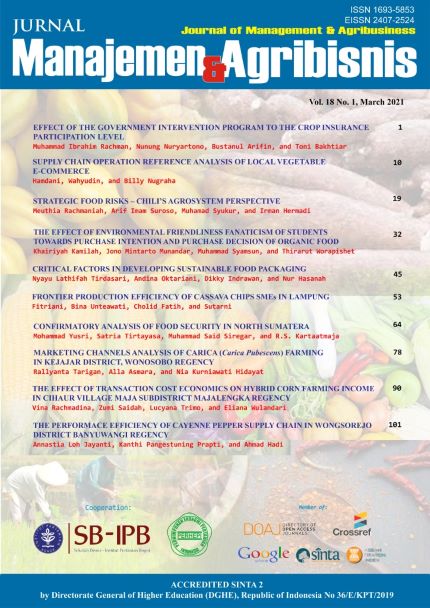THE EFFECT OF ENVIRONMENTAL FRIENDLINESS FANATICISM OF STUDENTS TOWARDS PURCHASE INTENTION AND PURCHASE DECISION OF ORGANIC FOOD
Abstract
Organic food (OF) market is claimed as the fastest growing market in 20th century. Therefore, there are much research about finding factors that affect purchase intention towards OF, one of them is the Food Choice Questionnaire (FCQ), by which it is easy to assess nine distinct food choice motives and one important domain which is represented in FCQ is food choice based on ethical reasons. However, environmental protection or ecological motives is the most important motive to consume organic food. This study aims to see how fanaticism towards eco-friendly would affect the purchase intention and decision of organic food from the student’s perspective. This study uses 250 respondents from agricultural universities in Indonesia and Thailand, picked by purposive sampling method. This study found that fanaticism towards environmental friendliness affects purchase intention of organic food and purchase intention, simultaneously affects the purchase decision significantly in both countries. The moderating effect of price only affects the effect purchase intention on purchase decision of organic food in Indonesia. This happens because Thailand and Indonesia have different fanatic score and level of household monthly income. This study is helped by SmartPLS 3.0 to run the SEM-PLS and VALS Survey to analyze characteristics of respondents.
Keywords: environment-friendly fanaticism, organic food, purchase intention, purchase decision, VALS Survey
Authors
Authors who publish with this journal agree to the following terms:
- Authors retain copyright and grant the journal right of first publication with the work simultaneously licensed under a Creative Commons Attribution License that allows others to share the work with an acknowledgement of the work's authorship and initial publication in this journal.
- Authors are able to enter into separate, additional contractual arrangements for the non-exclusive distribution of the journal's published version of the work (e.g., post it to an institutional repository or publish it in a book), with an acknowledgement of its initial publication in this journal.
- Authors are permitted and encouraged to post their work online (e.g., in institutional repositories or on their website) prior to and during the submission process, as it can lead to productive exchanges, as well as earlier and greater citation of published work (See The Effect of Open Access).

